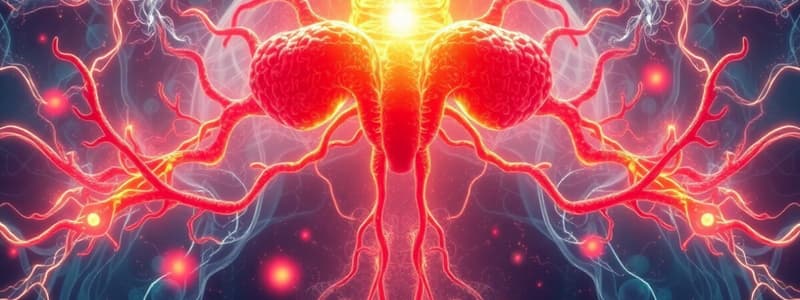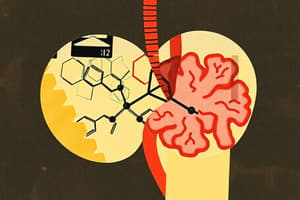Podcast
Questions and Answers
The hormone aldosterone is produced in the kidneys.
The hormone aldosterone is produced in the kidneys.
False (B)
Oxytocin stimulates the contraction of the uterus and milk ducts.
Oxytocin stimulates the contraction of the uterus and milk ducts.
True (A)
Insulin is produced by the pancreas and raises blood sugar levels.
Insulin is produced by the pancreas and raises blood sugar levels.
False (B)
The thyroid gland produces parathyroid hormone (PTH).
The thyroid gland produces parathyroid hormone (PTH).
Epinephrine helps to maintain blood pressure.
Epinephrine helps to maintain blood pressure.
The Pineal gland produces melatonin, which helps with sleep.
The Pineal gland produces melatonin, which helps with sleep.
Growth hormone releasing hormone (GHRH) is produced in the pituitary gland.
Growth hormone releasing hormone (GHRH) is produced in the pituitary gland.
Thyroid stimulating hormone (TSH) is responsible for regulating the production of adrenocorticotropin (ACTH).
Thyroid stimulating hormone (TSH) is responsible for regulating the production of adrenocorticotropin (ACTH).
Erythropoietin, produced by the kidneys, affects red blood cell (RBC) production.
Erythropoietin, produced by the kidneys, affects red blood cell (RBC) production.
Humoral factors from the thymus help develop the reproductive system.
Humoral factors from the thymus help develop the reproductive system.
Flashcards
What is the function of Corticosteroid?
What is the function of Corticosteroid?
A hormone produced by the adrenal glands that controls key functions in the body, acting as an anti-inflammatory and regulating blood sugar, pressure, muscle strength, and fluid balance.
What is the function of Antidiuretic hormone (vasopressin)?
What is the function of Antidiuretic hormone (vasopressin)?
A hormone secreted by the pituitary gland that affects water retention in the kidneys and controls blood pressure.
What is the function of Oxytocin?
What is the function of Oxytocin?
A hormone produced by the pituitary gland that stimulates contraction of the uterus during childbirth and milk ducts in the breast during breastfeeding.
What is the function of Glucagon?
What is the function of Glucagon?
Signup and view all the flashcards
What is the function of Estrogen?
What is the function of Estrogen?
Signup and view all the flashcards
What is the function of Thyroid hormone?
What is the function of Thyroid hormone?
Signup and view all the flashcards
What is the function of Epinephrine?
What is the function of Epinephrine?
Signup and view all the flashcards
What is the function of Testosterone?
What is the function of Testosterone?
Signup and view all the flashcards
What is the function of Melatonin?
What is the function of Melatonin?
Signup and view all the flashcards
What is the function of Growth hormone releasing hormone (GHRH)?
What is the function of Growth hormone releasing hormone (GHRH)?
Signup and view all the flashcards
Study Notes
Hormone Production Locations and Functions
-
Adrenal glands produce aldosterone, a hormone that regulates salt, water balance, and blood pressure. They also produce corticosteroid which controls various bodily functions including anti-inflammation, maintaining blood sugar, blood pressure, muscle strength, and salt/water balance. Epinephrine increases heart rate, oxygen intake, and blood flow. Norepinephrine maintains blood pressure.
-
Pituitary gland This gland produces many vital hormones:
- Antidiuretic hormone (vasopressin): Affects water retention and controls blood pressure.
- Adrenocorticotropic hormone (ACTH): Controls the production of sex hormones and reproductive cells.
- Growth hormone (GH): Impacts growth and development, protein production, and fat distribution.
- Luteinizing hormone (LH) and follicle-stimulating hormone (FSH): Control the production of sex hormones and reproductive cells.
- Oxytocin: Stimulates uterine contractions and milk duct release.
- Prolactin: Initiates and maintains milk production.
- Thyroid-stimulating hormone (TSH): Stimulates the thyroid gland to produce thyroid hormones.
-
Kidneys produce renin and angiotensin that directly affect blood pressure and also stimulate aldosterone. Erythropoietin is produced to regulate red blood cell production.
-
Pancreas produces glucagon to raise blood sugar and insulin to lower it, affecting the metabolism of glucose, protein, and fats.
-
Ovaries produce estrogen, crucial for female sexual characteristics, reproductive development, uterus function, breast development, and bone health. Progesterone stimulates uterine lining for fertilization and breast milk production.
-
Parathyroid glands produce parathyroid hormone (PTH), the main regulator of blood calcium levels.
-
Thyroid gland produces thyroid hormone, regulating metabolism, growth, maturation, nervous system activity, and metabolism.
-
Testes (testicles) produce testosterone, responsible for male sexual characteristics and maturation.
-
Pineal gland produces melatonin, aiding in sleep regulation.
-
Hypothalamus regulates several hormones released by the pituitary gland:
- Growth hormone releasing hormone (GHRH): Regulates growth hormone release.
- Thyrotropin releasing hormone (TRH): Regulates thyroid-stimulating hormone release.
- Gonadotropin releasing hormone (GnRH): Regulates LH/FSH production.
- Corticotropin releasing hormone (CRH): Regulates adrenocorticotropin release.
-
Thymus releases humoral factors, supporting the development of the lymphoid system.
Studying That Suits You
Use AI to generate personalized quizzes and flashcards to suit your learning preferences.



